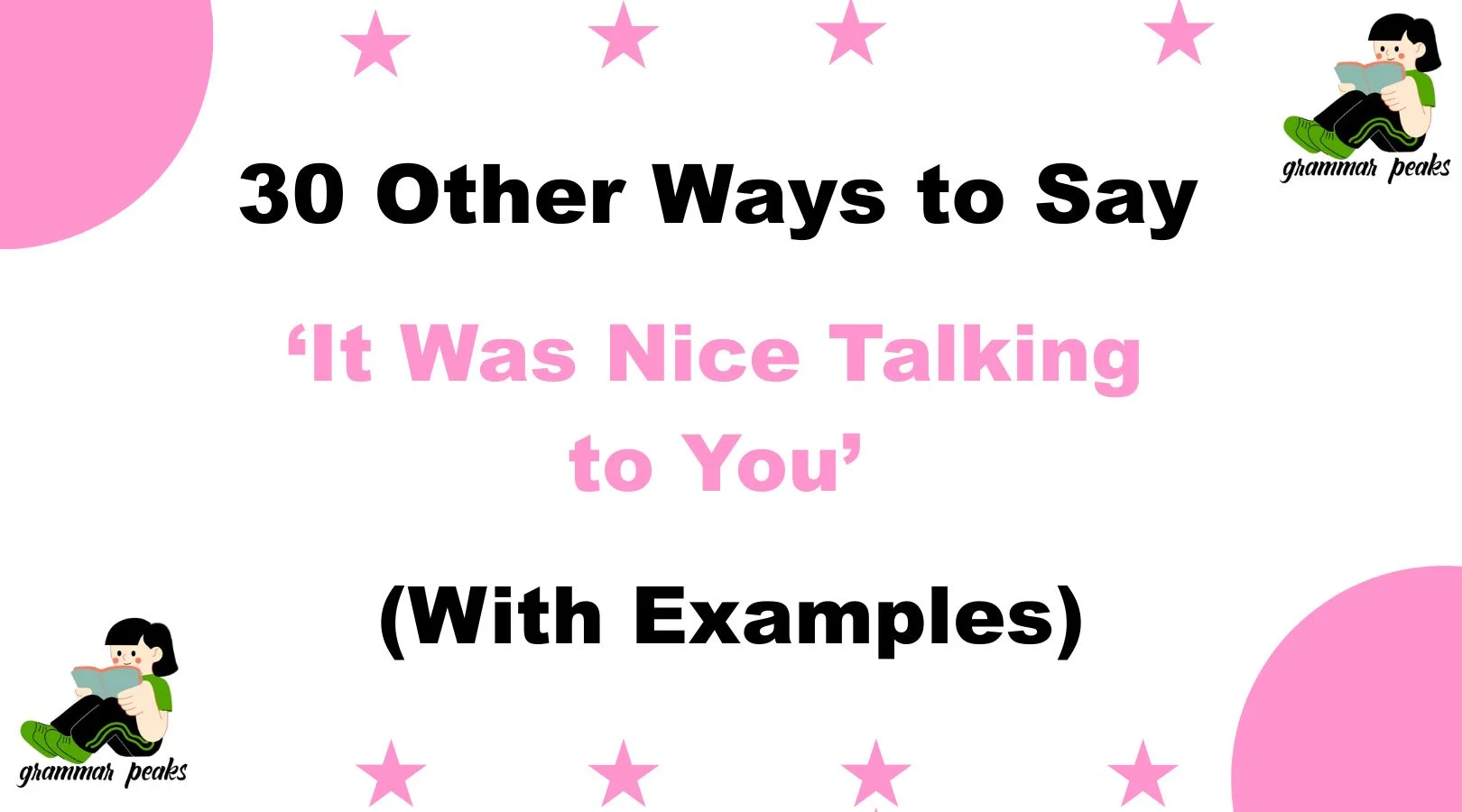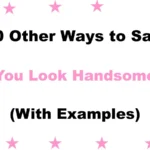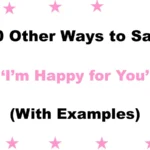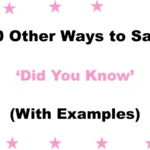Finding the right words to end a conversation warmly can leave a lasting impression. Saying “It was nice talking to you” is polite and friendly, but sometimes you want to express your feelings with a bit more personality and care. Using alternatives can make your message feel more personal, thoughtful, and meaningful,
whether in casual chats, professional meetings, or heartfelt conversations. In this article, you’ll discover 30 unique ways to say this phrase, each with clear explanations, examples, and tips on when and how to use them best.
What Does “It Was Nice Talking to You” Mean?
“It was nice talking to you“ is a polite and friendly phrase used to express appreciation for a conversation. It acknowledges that the interaction was pleasant, enjoyable, or meaningful. People often use it to end a conversation on a warm, positive note, whether in personal chats, professional meetings, or casual exchanges. The phrase helps maintain goodwill and can strengthen social or professional relationships.
When to Use “It Was Nice Talking to You”
Use this phrase when you want to:
- Politely close a conversation.
- Show appreciation for the exchange.
- Leave a positive impression.
- Signal the end of a discussion without awkwardness.
It fits well after meetings, phone calls, or casual chats with friends or acquaintances.
Is It Professional/Polite to Say “It Was Nice Talking to You”?
Yes, “It was nice talking to you” is both professional and polite, making it a widely accepted way to end conversations respectfully. It conveys warmth and appreciation without being overly casual, which makes it suitable for workplace interactions, interviews, or networking events. It helps leave a positive final impression, showing that you value the other person’s time and insights.
Pros and Cons of Saying “It Was Nice Talking to You”
Pros:
- Polite and respectful.
- Universally understood.
- Easy to say and sounds genuine.
Cons:
- Can feel generic or repetitive if overused.
- May lack personal warmth in close relationships.
- Sometimes too formal for very casual conversations.
Synonyms for “It Was Nice Talking to You”
- I enjoyed our conversation
- It was great catching up
- Thanks for the lovely chat
- I appreciate your time today
- It was wonderful speaking with you
- I’m glad we had this talk
- I enjoyed talking with you
- Thanks for sharing your thoughts
- It’s been a pleasure talking to you
- I look forward to our next chat
- Thanks for the great conversation
- I’ve enjoyed our discussion
- It was nice hearing your perspective
- I appreciate our time together
- It was lovely talking to you
- I’m grateful for our conversation
- Thank you for the insightful talk
- It was good to connect with you
- I enjoyed our exchange
- It was nice catching up with you
- I appreciate your company today
- It was great to chat with you
- Thanks for a meaningful conversation
- I enjoyed our dialogue
- It was nice talking with you
- I value our conversation
- Thanks for your time and thoughts
- It was a pleasure catching up
- I enjoyed our interaction
- Thanks for taking the time to talk
1. I enjoyed our conversation
Definition: Expresses that the discussion was pleasant and fulfilling.
Detailed Explanation: This phrase highlights your personal positive feelings about the exchange, showing engagement.
Scenario Examples: After a long phone call with a friend: “I really enjoyed our conversation today.”
Best Use: Informal and semi-formal contexts where you want to show genuine appreciation.
Worst Use: Could feel too casual in very formal business meetings.
Tone: Warm, sincere, and engaging.
2. It was great catching up
Definition: Indicates pleasure in reconnecting and updating each other.
Detailed Explanation: Implies you had a previous relationship and enjoyed renewing the connection.
Scenario Examples: After seeing an old colleague: “It was great catching up after all these years!”
Best Use: Informal conversations with friends, family, or acquaintances.
Worst Use: Not suitable for first-time meetings or professional contexts without a prior relationship.
Tone: Friendly and casual.
3. Thanks for the lovely chat
Definition: A grateful expression focusing on the pleasantness of the talk.
Detailed Explanation: Combines appreciation with an acknowledgment of the conversation’s enjoyable nature.
Scenario Examples: After a light-hearted coffee chat: “Thanks for the lovely chat. It brightened my day!”
Best Use: Informal or casual conversations with acquaintances or friends.
Worst Use: May sound too casual or informal for formal business meetings.
Tone: Cheerful and appreciative.
4. I appreciate your time today
Definition: Shows gratitude for the other person dedicating time to the conversation.
Detailed Explanation: Emphasizes respect for the person’s schedule and effort.
Scenario Examples: After a job interview: “I appreciate your time today and the opportunity to discuss the role.”
Best Use: Professional or formal settings.
Worst Use: Too formal or stiff for casual conversations.
Tone: Respectful and courteous.
5. It was wonderful speaking with you
Definition: Expresses that the interaction was delightful and meaningful.
Detailed Explanation: Conveys that the conversation was a positive and memorable experience.
Scenario Examples: After a mentorship session: “It was wonderful speaking with you; I learned a lot.”
Best Use: Semi-formal to formal conversations where warmth is appropriate.
Worst Use: May feel overly formal in very casual chats.
Tone: Warm, respectful, and polished.
6. I’m glad we had this talk
Definition: Shows satisfaction and appreciation for the conversation’s occurrence.
Detailed Explanation: Highlights the value you found in the discussion.
Scenario Examples: After resolving a misunderstanding: “I’m glad we had this talk; it cleared things up.”
Best Use: Personal conversations with friends, family, or coworkers.
Worst Use: Might be inappropriate if the talk was brief or unimportant.
Tone: Thoughtful and sincere.
7. I enjoyed talking with you
Definition: Similar to the first phrase but slightly more casual and direct.
Detailed Explanation: A straightforward way to say you found the interaction enjoyable.
Scenario Examples: After a casual phone call: “I really enjoyed talking with you tonight.”
Best Use: Informal and casual contexts.
Worst Use: Could feel too simple in formal or professional settings.
Tone: Friendly and approachable.
8. Thanks for sharing your thoughts
Definition: Appreciates the other person’s openness and contributions.
Detailed Explanation: Focuses on valuing the insights or opinions shared.
Scenario Examples: After a brainstorming meeting: “Thanks for sharing your thoughts; they were very helpful.”
Best Use: Professional and personal discussions involving ideas or advice.
Worst Use: Not ideal when the conversation was purely social.
Tone: Appreciative and respectful.
9. It’s been a pleasure talking to you
Definition: Formal and warm way to say the conversation was enjoyable.
Detailed Explanation: Conveys a polite and heartfelt appreciation for the interaction.
Scenario Examples: After networking with a new professional contact: “It’s been a pleasure talking to you—let’s stay in touch.”
Best Use: Formal or semi-formal contexts.
Worst Use: May feel too stiff in casual chats.
Tone: Polite, warm, and professional.
10. I look forward to our next chat
Definition: Expresses eagerness for future conversations.
Detailed Explanation: Signals interest in maintaining the relationship or dialogue.
Scenario Examples: After a good meeting: “I look forward to our next chat.”
Best Use: Semi-formal or informal situations where ongoing communication is expected.
Worst Use: Avoid if you don’t actually plan to talk again.
Tone: Positive, hopeful, and friendly.
11. Thanks for the great conversation
Definition: Expresses gratitude for an engaging and enjoyable discussion.
Detailed Explanation: This phrase acknowledges the quality of the conversation, highlighting that it was both enjoyable and meaningful.
Scenario Example: After a productive meeting with a colleague: “Thanks for the great conversation today; your insights were invaluable.”
Best Use: Professional settings where the discussion was particularly insightful or productive.
Worst Use: May seem insincere if the conversation lacked depth or engagement.
Tone: Appreciative and professional.
12. I’ve enjoyed our discussion
Definition: Indicates that the speaker found the conversation pleasurable and worthwhile.
Detailed Explanation: This phrase conveys a sense of satisfaction with the exchange of ideas or information.
Scenario Example: After a brainstorming session: “I’ve enjoyed our discussion and look forward to implementing these ideas.”
Best Use: Academic or professional environments where ideas are exchanged.
Worst Use: Might come off as formal in casual conversations.
Tone: Reflective and appreciative.
13. It was nice hearing your perspective
Definition: Acknowledges the value of the other person’s viewpoint.
Detailed Explanation: This phrase shows respect for the other person’s opinions and contributions to the conversation.
Scenario Example: After a debate or discussion: “It was nice hearing your perspective; it gave me a lot to think about.”
Best Use: Discussions involving differing viewpoints or debates.
Worst Use: May not be suitable if the conversation was one-sided.
Tone: Respectful and thoughtful.
14. I appreciate our time together
Definition: Expresses gratitude for the shared time and interaction.
Detailed Explanation: This phrase emphasizes the value of the time spent together, regardless of the conversation’s content.
Scenario Example: After a mentoring session: “I appreciate our time together; your guidance means a lot to me.”
Best Use: Mentorships, counseling sessions, or any meaningful one-on-one interactions.
Worst Use: Could seem overly formal in casual settings.
Tone: Grateful and sincere.
15. It was lovely talking to you
Definition: A warm and friendly way to express enjoyment of the conversation.
Detailed Explanation: This phrase adds a touch of elegance and warmth to the farewell.
Scenario Example: After meeting someone at a social event: “It was lovely talking to you; I hope we cross paths again soon.”
Best Use: Social gatherings, networking events, or casual meetings.
Worst Use: May seem too informal in strict professional contexts.
Tone: Charming and friendly.
16. I’m grateful for our conversation
Definition: Shows deep appreciation for the dialogue shared.
Detailed Explanation: This phrase conveys that the conversation had a significant impact or provided valuable insights.
Scenario Example: After a heartfelt discussion: “I’m grateful for our conversation; it helped me see things more clearly.”
Best Use: Personal or emotionally significant conversations.
Worst Use: Might be too intense for light or casual chats.
Tone: Earnest and heartfelt.
17. Thank you for the insightful talk
Definition: Expresses thanks for a conversation that provided new understanding or knowledge.
Detailed Explanation: This phrase highlights that the discussion was enlightening or educational.
Scenario Example: After a seminar or lecture: “Thank you for the insightful talk; I learned a great deal.”
Best Use: Educational or professional settings.
Worst Use: May seem out of place in casual conversations.
Tone: Professional and appreciative.
18. It was good to connect with you
Definition: Indicates that establishing a connection was valuable.
Detailed Explanation: This phrase emphasizes the importance of building relationships.
Scenario Example: After a networking event: “It was good to connect with you; let’s keep in touch.”
Best Use: Networking or initial meetings.
Worst Use: Might be vague if no meaningful connection was established.
Tone: Friendly and open.
19. I enjoyed our exchange
Definition: Conveys pleasure in the mutual sharing of ideas or conversation.
Detailed Explanation: This phrase is suitable for discussions where both parties contributed equally.
Scenario Example: After a collaborative meeting: “I enjoyed our exchange and look forward to future collaborations.”
Best Use: Collaborative or reciprocal discussions.
Worst Use: May not fit if the conversation was one-sided.
Tone: Balanced and appreciative.
20. It was nice catching up with you
Definition: Expresses enjoyment in reconnecting after some time apart.
Detailed Explanation: This phrase is ideal for meetings with old friends or colleagues.
Scenario Example: After meeting an old friend: “It was nice catching up with you; let’s not wait so long next time.”
Best Use: Reunions or meetings after a long time.
Worst Use: Inappropriate for first-time meetings.
Tone: Nostalgic and warm.
21. I appreciate your company today
Definition: Thanks to someone for spending time together.
Detailed Explanation: This phrase emphasizes the value of the person’s presence.
Scenario Example: After a lunch meeting: “I appreciate your company today; it was a pleasant break from work.”
Best Use: Social or informal settings.
Worst Use: May seem too personal in formal business contexts.
Tone: Friendly and appreciative.
22. It was great to chat with you
Definition: A casual way to express enjoyment of the conversation.
Detailed Explanation: This phrase is informal and suitable for light-hearted interactions.
Scenario Example: After a casual phone call: “It was great to chat with you; let’s catch up again soon.”
Best Use: Informal or friendly conversations.
Worst Use: Too casual for formal or professional settings.
Tone: Relaxed and cheerful.
23. Thanks for a meaningful conversation
Definition: Expresses gratitude for a deep or significant discussion.
Detailed Explanation: This phrase acknowledges the depth and importance of the conversation.
Scenario Example: After a serious discussion: “Thanks for a meaningful conversation; it gave me a lot to reflect on.”
Best Use: Personal or profound discussions.
Worst Use: May seem overly serious for light conversations.
Tone: Reflective and sincere.
24. I enjoyed our dialogue
Definition: A formal way to express pleasure in the conversation.
Detailed Explanation: This phrase is suitable for professional or intellectual exchanges.
Scenario Example: After a panel discussion: “I enjoyed our dialogue and hope to collaborate in the future.”
Best Use: Academic or professional settings.
Worst Use: Too formal for casual chats.
Tone: Professional and respectful.
25. It was nice talking with you
Definition: A slight variation of the original phrase, maintaining its polite tone.
Detailed Explanation: This phrase is universally acceptable and slightly more casual.
Scenario Example: After a brief meeting: “It was nice talking with you; have a great day.”
Best Use: General use in various contexts.
Worst Use: May seem generic if overused.
Tone: Polite and neutral.
26. I value our conversation
Definition: Indicates that the discussion was important and appreciated.
Detailed Explanation: This phrase conveys that the conversation had significance.
Scenario Example: After a mentoring session: “I value our conversation and the guidance you provided.”
Best Use: Mentorships or significant discussions.
Worst Use: May seem too intense for casual talks.
Tone: Serious and appreciative.
27. Thanks for your time and thoughts
Definition: Expresses gratitude for both the person’s time and their input.
Detailed Explanation: This phrase is suitable for professional settings where advice or opinions were shared.
Scenario Example: After a consultation: “Thanks for your time and thoughts; they were very helpful.”
Best Use: Professional or advisory contexts.
Worst Use: May seem too formal for casual conversations.
Tone: Professional and respectful.
28. It was a pleasure catching up
Definition: Conveys enjoyment in reconnecting with someone.
Detailed Explanation: This phrase is ideal for meetings with acquaintances or friends after some time.
Scenario Example: After a coffee meeting with a former colleague: “It was a pleasure catching up; let’s do it again soon.”
Best Use: Reunions or social gatherings.
Worst Use: Inappropriate for first-time meetings.
Tone: Warm and friendly.
29. I enjoyed our interaction
Definition: A general way to express pleasure in the exchange.
Detailed Explanation: This phrase is versatile and can be used in various contexts.
Scenario Example: After a customer service call: “I enjoyed our interaction; thanks for your assistance.”
Best Use: Customer service or brief professional interactions.
Worst Use: May seem impersonal in close relationships.
Tone: Neutral and polite.
30. Thanks for taking the time to talk
Definition: Expresses gratitude for the person’s time and willingness to converse.
Detailed Explanation: This phrase acknowledges the effort the other person made to engage in the conversation.
Scenario Example: After a job interview: “Thanks for taking the time to talk; I appreciate the opportunity.”
Best Use: Professional or formal settings.
Worst Use: May seem too formal in casual conversations.
Tone: Respectful and appreciative.
Conclusion
Expressing yourself with warmth and thoughtfulness when ending a conversation can deepen relationships and leave positive impressions. Each alternative phrase offers a unique tone and nuance, suited for different contexts—whether professional, casual, or personal. By choosing words that reflect your true feelings and the nature of your connection, you create meaningful communication moments that go beyond a simple goodbye.
FAQs
1. Why should I use different ways to say “It was nice talking to you”?
Using varied phrases helps keep your conversations fresh and meaningful. It shows thoughtfulness and can better reflect your feelings, making your communication warmer and more personal.
2. Are these alternatives suitable for professional settings?
Yes! Many of the alternatives listed are perfect for professional environments. Phrases like “Thanks for the great conversation” or “I appreciate your time and thoughts” convey professionalism while maintaining warmth.
3. Can I use these phrases in casual conversations?
Absolutely! Some phrases, like “It was lovely talking to you” or “It was great to chat with you,” are casual and friendly, ideal for informal chats with friends or acquaintances.
4. How do I choose the best phrase for my situation?
Consider the context and your relationship with the person. For formal meetings, stick with professional expressions. For friends or family, warmer and more casual phrases work better. Always aim for sincerity in your tone.
5. Can using varied phrases improve my communication skills?
Definitely. Using diverse expressions helps you articulate your feelings better, strengthens relationships, and enhances your overall communication style by making interactions more engaging and thoughtful.

Mia Rose is a passionate Language Coach and Contributor at GrammarPeaks, where she specializes in practical grammar tips and language learning strategies. With a strong foundation in education and communication, Mia brings a friendly, approachable style to her writing. Her goal is to make complex grammar rules simple and usable for learners at any level, helping them grow in both confidence and fluency.





